- Home
- Matt Rogers
Savages: A Jason King Thriller (The Jason King Files Book 3) Page 4
Savages: A Jason King Thriller (The Jason King Files Book 3) Read online
Page 4
‘Search my bag if you want. I’ve got nothing. Just an address.’
‘Where are you going?’
‘Did my people tell you?’
‘They did not share.’
‘So why do you think I would share?’
The man who spoke English smiled, flashing a gaping maw of broken yellow teeth, and gestured over King’s shoulder. He turned, sensing no threat, following the direction of the man’s gaze. He saw the cargo plane stopped at the opposite end of the runway, the ground around it swarming with workers unloading crates.
‘Because that is your only way in and out of our country,’ the man said. ‘So maybe — if you are here now — you must do what we say?’
‘We going down that path?’
‘I do not know. Are you telling the truth about having no cash?’
‘I am. But either way, that doesn’t matter anymore.’ King stooped down and snatched the duffel off the ground, swinging it back over his shoulder. ‘You’re not looking in my bag.’
The man smiled, but there were sinister intentions behind the thin veil of pleasantry. ‘I think we can do what we want with you. You are now in our hands.’
‘Am I?’
‘Where are your friends?’
‘Don’t need friends.’
No-one reached for their weapons.
But the atmosphere had palpably shifted — King was ready to inflict the beating of a lifetime upon whoever he could get his hands on in the next few seconds. He tensed up like a coiled spring, his muscles rippling with anticipation. The trio of soldiers separated by the language barrier began to nervously shift their weight back and forth between feet, recognising the conversation had changed trajectory.
‘You trying to push me around?’ King said. ‘You think that’s the right idea?’
‘We tell you what is right and wrong,’ the fourth man said. ‘You are ours.’
‘This is how it’s going down?’
‘We will search your bag.’
‘No you won’t.’
‘We are not giving you a choice.’
‘Nor am I.’
‘My friend…’
‘We’re not friends,’ King said. ‘Not even close. What happens now? I’ve told you you’re not searching my bag.’
‘Why not?’
‘Matter of principle.’
‘I don’t follow.’
‘I let you do that, you make another request. Then another. Then another. This is the end of the road — right now. What are we doing?’
‘Put the bag on the ground.’
‘No.’
Tension ran thick, hanging over everything, leeching more sweat from King’s pores. He was ready to explode, his fists subtly curling and his fast-twitch muscle fibres firing on all cylinders. He stood only a few feet away from the translator — a jumping right hook to the chin would send him crashing to the tarmac, no doubt inflicting some kind of brain damage when the back of his skull cracked on the concrete. Then King could wrestle the Kalashnikov off the guy and unload the magazine into the other three.
He might be able to pull it off in time.
Or not.
Either way, he was ready.
The silence dragged on, reaching an uncomfortable length. A single second in time ticked over and with that King realised conflict was inevitable — he began to rock back and forth on his heels, anticipating a barrage of movement at any moment. The conversation had drawn out too long, laced with the kind of tension that came from five testosterone-fuelled combatants in a tight group with no witnesses in sight.
Not that witnesses would care, in any case.
This was the Congo, after all.
Before departing, Lars had told King that nearly fifty thousand people died each month in the country.
One American wouldn’t cause much of a ripple.
Then the translator reached for his pocket, and King prepared to unleash a staggering uppercut into the guy’s unprotected face if he came out with a weapon…
…which coloured him surprised when the man produced a set of keys on a thick metal ring. He tossed them over, underhand, and King caught them. The keys jangled together, gripped in his sweaty palm.
The atmosphere shifted again.
‘I do not feel like getting blood on my hands today,’ the man said. ‘Plenty of time for that later. And your people paid well. Enjoy your time in the Congo, my friend.’
The other three soldiers remained still as statues, as if the tension had never elevated at all. Perhaps they were so used to combat that it had become monotonous to them. Perhaps they slaughtered daily. King would never know. He wasn’t here to pick a fight with every murderer in Africa.
He glanced imperceptibly toward the convoy of vehicles and the translator ushered him to the closest SUV — an open-topped jeep.
Deja vu again.
Somalia.
A cargo plane.
An airfield.
An open-topped jeep.
This is just training, King told himself.
Shrugging off echoes of trauma, he moved away from the four men without a second look in their direction. When he rounded the jeep’s hood and hurled his duffel bag into the passenger seat, he allowed himself to release what he’d thought would be his final breath.
Four on one on an empty airfield would never have worked in his favour.
To survive he needed close quarters, and chaos, and the element of surprise.
If the confrontation had turned to combat, he would have died.
Thanking his lucky stars, he fired up the jeep and stamped on the accelerator. With a twist of the wheel he gunned the military vehicle out of the airfield’s perimeter and mounted a dirt trail leading in the general direction of Brody’s compound.
He knew little about where he was headed, or what kind of resistance he was likely to face.
Alone in the Congo, he realised Lars had most definitely intended this to be a trial. He had nothing but a satellite GPS unit that had been left on the passenger seat by the four Congolese soldiers, obviously a direct request from his superiors. There was no doubt a preprogrammed route would lead to Brody’s compound, but for now he understood the need to head east.
Brody lived in the shadow of Mount Nyiragongo, a staggering stratovolcano near the Rwandan border. King had thought Lars was joking when his handler fed him that snippet of information — it sounded like something out of a bad action movie.
‘Don’t worry,’ Lars had said. ‘There’s almost no chance of eruption — or, at least, anything that will put you in danger. But it’s a lawless wasteland out there, which I think Brody prefers. The pair of you won’t be disturbed.’
King left the GPS unit on the torn leather of the passenger seat, wrapping both hands around the scorching wheel. He set off through green hills, tasting the thickness of the jungle air.
He needed to calm his mind.
He had a feeling painful days lay ahead.
7
The terrain blurred into a seething mass of raw energy — King spent the duration of the drive with his foot firmly planted on the accelerator, keeping a frantic pace so he didn’t get stopped by inquisitive rebels or bandits. He lost count of the number of times he blazed past a procession of armed men loitering trailside, their eyes piercing into the back of his skull as he charged past.
None — at least so far — had felt the need to give pursuit.
King fired up the GPS half an hour into the drive, reading a quick message displayed on the screen from Lars. It informed him of a M45 MEUSOC — the same pistol he’d used almost exclusively in Somalia — in the glove compartment. King briefly wondered how Lars had managed to get the weapon in-country so fast, then realised the timeline didn’t add up.
The Congolese soldiers had provided the gun.
What were they doing with U.S. Special Forces gear?
King shrugged off that line of thought and concentrated on the road ahead. The GPS took him through the heart of several rural
villages — Bukombo, Loashi, and Masisi consecutively. He never would have known the names if not for the tiny electronic screen on the seat across from him. He took in almost no detail as he passed by, despite the curious stares of villagers, rebels, and bandits alike.
Subconsciously, he knew why.
He was a man of vengeance. If he stopped and scrutinised too long he would find obscene acts of wrongdoing without much trouble — and he knew, if he let himself, he had the capacity to spend the rest of his life in the Congo. This was, by all definitions, an active war zone. Men and women and children were slaughtered daily for a complex web of reasons, and King knew he was fooling himself if he thought he could manage even a dent in the grand scheme of things.
Lars was right. He and his colleagues and superiors were the brains behind Black Force — King wasn’t the man to decide where to aim his focus. He had to follow the commands of his superiors or he would get lost in the madness. He had the physical ability but he couldn’t solve all the world’s problems at once — men smarter than himself had to decide the most pressing issues and correct his course accordingly.
So he ignored the mass scale suffering all around him and pushed forward, following the tiny blue trail on the GPS screen without fault. He pictured himself as a horse with blinkers attached, preventing him from having his attention seized by something detrimental.
Too late.
It happened right as he was closing in on Sake, the final pit stop before Brody’s place. The small town was situated at the edge of a broad expanse of uninhabitable plains, all surrounding the base of Mount Nyiragongo. Even from a dozen miles away King glimpsed the colossal mound spearing into the sky, overshadowing everything around it. It provided an awe-inspiring backdrop, one that captivated his full attention…
…until the pair of Congolese civilians materialised on the trail ahead.
Even from the briefest of glances King realised he would have to intervene. A man and a woman struggled with the kind of verve that could only be explained by a life or death battle.
And the woman was losing.
King didn’t know the finer details. He didn’t know the motivations or the build-up to the conflict, or the nature of the dispute. But as the jeep approached the pair squirming for the upper hand in the dirt, blood pooling around the side of the woman’s head, he realised he couldn’t simply steer around this particular incident.
Despite Lars’ words roaring in his ears — and simple common sense vying for control — he squashed a foot against the brake pedal and veered the jeep to the side of the trail, pulling into a shallow ditch overflowing with weeds and flora. He snatched the MEUSOC pistol off the passenger’s seat by its rubber-coated grip, thumbed the safety off, and shouldered the driver’s side door open.
Time was of the essence.
The woman screamed, the noise biting through the relative peacefulness of the region. King was far off the beaten track by this point. The scream turned to a gurgle, and King saw red as he caught a glimpse of the lanky man scrambling for top position, raining down punches with his entire bodyweight behind them, his intentions clearly lethal.
He was going to beat this woman to death in the middle of the road.
And there was no-one around to prevent it.
King raised the pistol and roared a guttural noise, his voice cutting down the trail like a knife. It shocked the pair into hesitation — in the heat of the moment, consumed by adrenalin, neither of them had noticed his jeep’s arrival.
The man leapt to his feet, his face bloody with scratches and his teeth bared. King recognised the look in the guy’s eyes — he was hopped up on a vicious cocktail of drugs. Heroin or meth or something grown in the Congo — there was no way to tell. But King recognised the pained, bloodshot, rabid expression and knew there would be no peaceful solution to the following confrontation.
Of course, he’d thought that at the airfield, too.
But this was different.
The guy charged at King — full-pelt, without a beat of hesitation. King faltered. It would be effortless to look down the iron sights and drill a round through his forehead, but then what? He hadn’t come to the Congo to kill anyone, and in the current circumstances he wasn’t intent on dealing with a body before he even made it to Brody’s compound.
So, as the unarmed man sprinted across the trail, with the heat hanging heavy over both of them, King tossed the MEU pistol into the dirt.
Not yet, he thought. Hold onto a shred of sanity before you lose yourself in this place.
Today wasn’t the day to murder anyone.
He didn’t know the full story.
The crazed Congolese man — well over six feet tall, all skin and bone, draped in ragged clothing — closed the distance with a gait similar to that of a demon from a horror movie, his strides long and his teeth bared. The guy ducked down in an attempt to ram a shoulder into King’s stomach, taking the pair of them off their feet where he imagined he could take advantage on the ground.
King looped a powerful arm around the guy’s neck, springing off the mark like a python snatching its prey. With the man’s face pointed toward the ground and all the momentum surging forward, King leapt off the ground as soon as he had a headlock-style hold on the guy’s throat and wrapped both legs around his mid-section, hanging onto his front, as if the man were wearing him as a front-facing backpack.
With all two hundred pounds of King’s weight hanging off his neck, the guy was helpless to stay upright. He lost his balance and sprawled face-first toward the ground. King went with him. The whole time he maintained unbelievable pressure on the back of the guy’s neck, pinning his chin to his chest.
The guillotine choke.
A Brazilian jiu-jitsu staple.
There was nothing the guy could do.
He swatted and writhed and slapped at King’s ribcage in a feeble attempt to break free, but the pain of the choke overwhelmed him. King had been caught in nasty guillotines before on the mats. With pressure applied in correct fashion, it felt like your whole head was about to explode, like a literal decapitation was imminent. And that was in the controlled boundaries of jiu-jitsu rolling sessions.
Here, in the heat and the muck, King squeezed as if his life depended on it.
It took twenty seconds for the man’s agonising descent into unconsciousness to run its course.
The body slackened on top of King, and he released his grip in an instant. He was back to his feet in seconds, leaving the unconscious guy face-down in the dirt. A dozen feet ahead, the woman had made it to her feet, her face a swollen, bloody mess.
‘I don’t know if you can understand me,’ King said, panting with exertion. ‘But I would run.’
She simply stared.
‘I can’t stay and help. I’m sorry.’
She said nothing.
He fetched the MEU pistol out of the dirt and threw it back into the jeep. He climbed back in through the open driver’s door and secured his seatbelt and set off, steering right around the bloodied, battered woman. She seemed to be in her thirties, and thin as a rake, but King didn’t want to soak in any more details.
He couldn’t.
Internally the doubt wracked him, screaming at him to stay.
To help.
But this was exactly what he needed to avoid.
Concerning himself with the business of every person he ran across would consume every waking moment. He would do what he could. But he needed to focus on the bigger picture.
As he left the sorry scene behind in a trail of dust, a wave of doubts washed over him.
If you have the physical ability to right almost any wrong … where do you draw the line?
8
The room had no distinguishable features, to the point where nothing around Lars Crawford even hinted at a location. He sat in a dull windowless box, eerily similar to a prison cell, but fortunately at this stage of his life he was the one with the power to put people in cells.
Different cells.<
br />
The worst kind of cells.
A career in black operations — no matter how uneventfully or pleasantly it unfolded — was never accompanied by easy decision-making. He hadn’t been in this world long, but over the course of the last few months his life had become total madness. The learning curve had been the polar opposite of comfortable, something he was still adjusting to. The consequences of his decisions at this level of the game were unparalleled — he was still acclimatising to the second and third-hand ramifications of his actions.
At the same time, he was knee-deep in bureaucratic warfare, battling to convince a small army of diplomats that a certain operative named Jason King should be given absolute discretion to act however he saw fit in the field.
No-one was taking the decision lightly.
Not even King himself.
Something had happened in Somalia. Lars wasn’t sure what — King had been sparse on the finer details — but he’d quietly pulled his handler aside and insisted on checks and balances. Lars remembered the conversation like it was yesterday.
You need to keep control of me, King had said.
Why? What have you done? Lars had responded.
It’s not what I’ve done. It’s what I’m capable of doing.
Those thoughts ran through his head as he pictured what might happen in the Democratic Republic of the Congo. Brody Hartman was the most relentless bastard Lars had ever had the pleasure of compromising with. In short, the government recognised his unique talent for training operatives and needed this one last favour, both to hone King’s unbelievable genetic gifts into something of a weapon whilst buying time for Lars to establish Black Force’s place in the shadowy military underworld.
The foolhardiness of the man sitting across from him didn’t help.
‘Rex,’ Lars said, his mouth a cold unwavering line. ‘We’re not discussing this anymore.’
Rex Bernardi leant back in his chair, his posture rigid, his shoulders broad, all the characteristics of military discipline still present in his demeanour. His transition to the role of an intelligence agent had not been easy — mostly because he was so damn good at his job. He’d been offered a role in Black Force’s inner workings within weeks of the division being established. Now Lars had the unpleasant role of taming his reckless streak.

 Nature and Blight
Nature and Blight The Wolves of Third Clan
The Wolves of Third Clan Ghosts
Ghosts Bear
Bear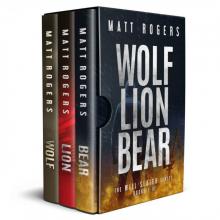 The Will Slater Series Books 1-3
The Will Slater Series Books 1-3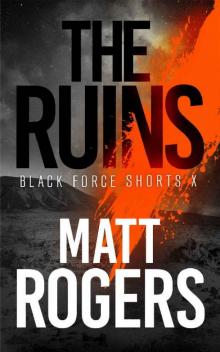 The Ruins
The Ruins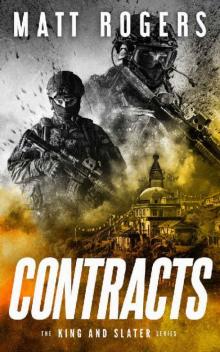 Contracts
Contracts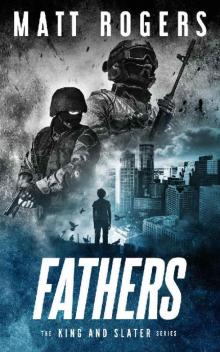 Fathers
Fathers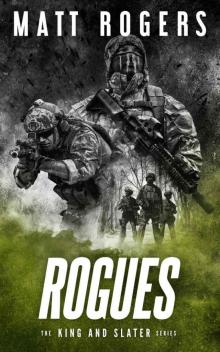 Rogues: A King & Slater Thriller
Rogues: A King & Slater Thriller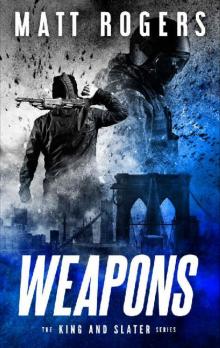 Weapons
Weapons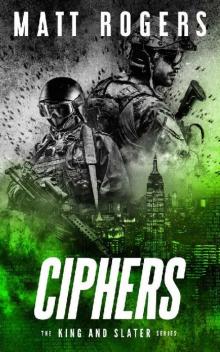 Ciphers
Ciphers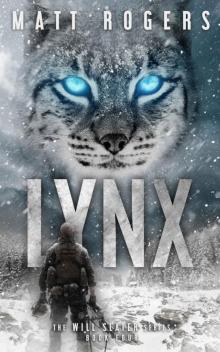 Lynx
Lynx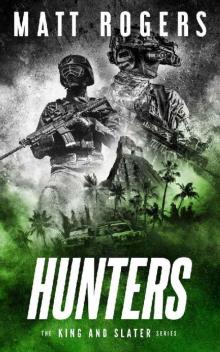 Hunters
Hunters Of Superior Design
Of Superior Design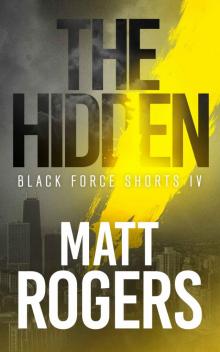 The Hidden: A Black Force Thriller (Black Force Shorts Book 4)
The Hidden: A Black Force Thriller (Black Force Shorts Book 4) Blood Money
Blood Money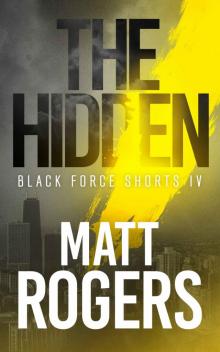 The Hidden_A Black Force Thriller
The Hidden_A Black Force Thriller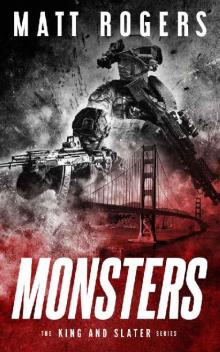 Monsters
Monsters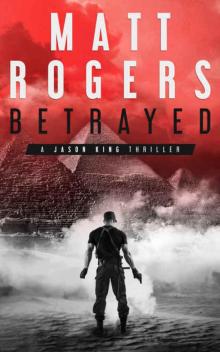 Betrayed: A Jason King Thriller (Jason King Series Book 4)
Betrayed: A Jason King Thriller (Jason King Series Book 4)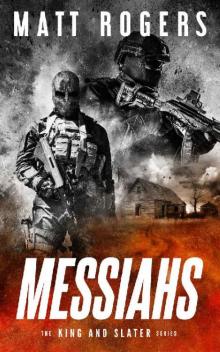 Messiahs
Messiahs The Wicked_A Black Force Thriller
The Wicked_A Black Force Thriller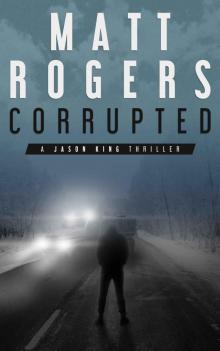 Corrupted: A Jason King Thriller (Jason King Series Book 5)
Corrupted: A Jason King Thriller (Jason King Series Book 5)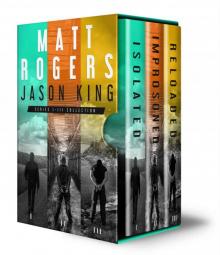 The Jason King Series: Books 1-3
The Jason King Series: Books 1-3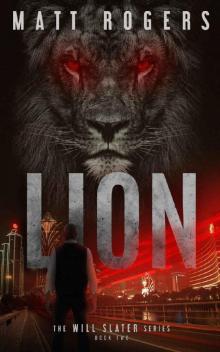 Lion
Lion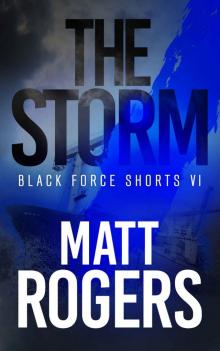 The Storm: A Black Force Thriller (Black Force Shorts Book 6)
The Storm: A Black Force Thriller (Black Force Shorts Book 6)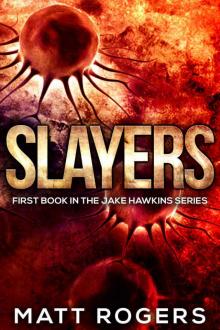 Slayers (Jake Hawkins Book 1)
Slayers (Jake Hawkins Book 1)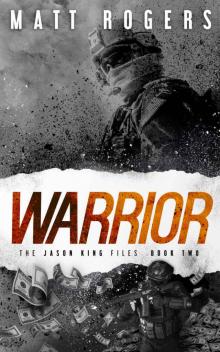 Warrior: A Jason King Thriller (The Jason King Files Book 2)
Warrior: A Jason King Thriller (The Jason King Files Book 2)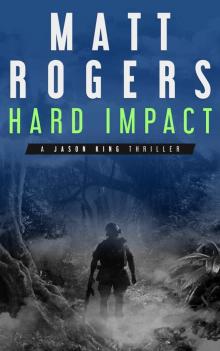 Hard Impact: A Jason King Operation (Jason King Series Book 0)
Hard Impact: A Jason King Operation (Jason King Series Book 0) The Wicked: A Black Force Thriller (Black Force Shorts Book 7)
The Wicked: A Black Force Thriller (Black Force Shorts Book 7)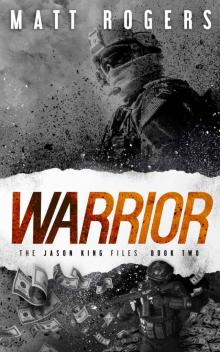 Warrior_A Jason King Thriller
Warrior_A Jason King Thriller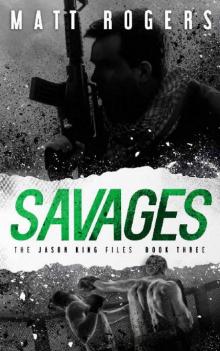 Savages: A Jason King Thriller (The Jason King Files Book 3)
Savages: A Jason King Thriller (The Jason King Files Book 3)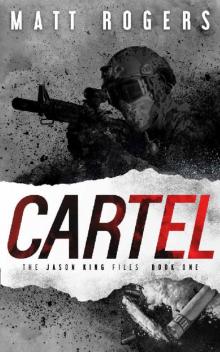 Cartel: A Jason King Thriller (The Jason King Files Book 1)
Cartel: A Jason King Thriller (The Jason King Files Book 1)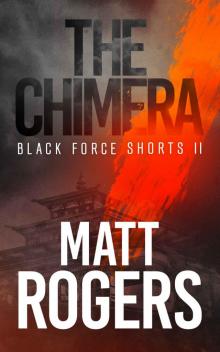 The Chimera_A Black Force Thriller
The Chimera_A Black Force Thriller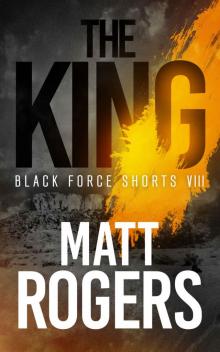 The King: A Black Force Thriller (Black Force Shorts Book 8)
The King: A Black Force Thriller (Black Force Shorts Book 8)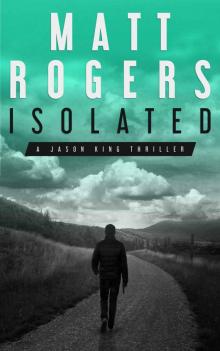 Isolated: A Jason King Thriller (Jason King Series Book 1)
Isolated: A Jason King Thriller (Jason King Series Book 1) The Victor: A Black Force Thriller (Black Force Shorts Book 1)
The Victor: A Black Force Thriller (Black Force Shorts Book 1)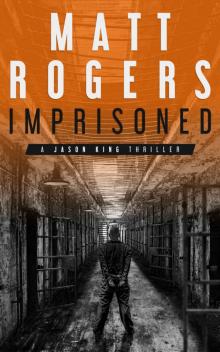 Imprisoned: A Jason King Thriller (Jason King Series Book 2)
Imprisoned: A Jason King Thriller (Jason King Series Book 2)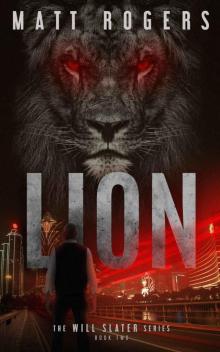 Lion: A Will Slater Thriller (Will Slater Series Book 2)
Lion: A Will Slater Thriller (Will Slater Series Book 2)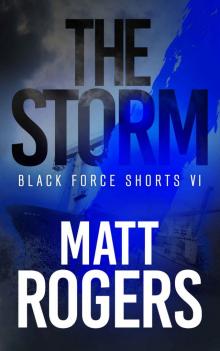 The Storm_A Black Force Thriller
The Storm_A Black Force Thriller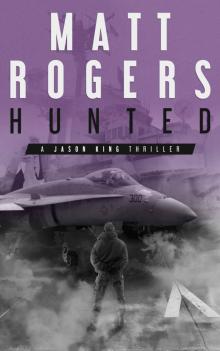 Hunted: A Jason King Thriller (Jason King Series Book 6)
Hunted: A Jason King Thriller (Jason King Series Book 6)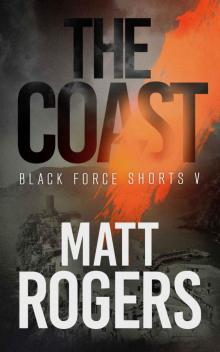 The Coast: A Black Force Thriller (Black Force Shorts Book 5)
The Coast: A Black Force Thriller (Black Force Shorts Book 5)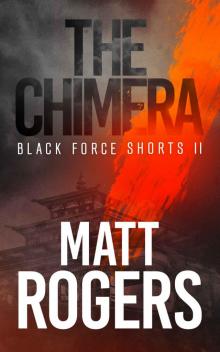 The Chimera: A Black Force Thriller (Black Force Shorts Book 2)
The Chimera: A Black Force Thriller (Black Force Shorts Book 2)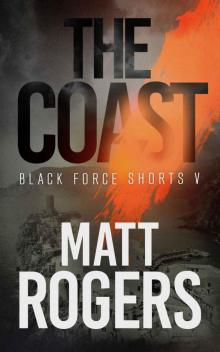 The Coast_A Black Force Thriller
The Coast_A Black Force Thriller